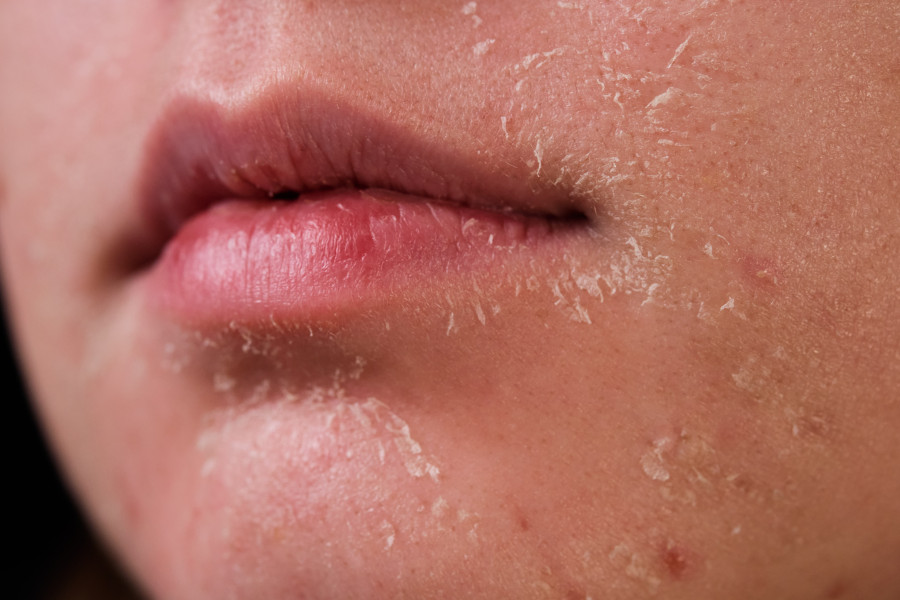Life & Style
Keeping skin healthy in dry seasons
In such times, it is vital to adjust skincare routines to maintain healthy and hydrated skin.
Anish Ghimire
When the dry season begins, our skin starts feeling rough and depleted due to moisture loss caused by the drop in humidity and the harsh surroundings. But we can help skin stay healthy even during the worst dry periods by following a regular and effective skincare routine and being conscious of our skin’s needs.
Dr Vikash Paudel, who is an assistant professor in the Department of Dermatology and Venereology of Patan Hospital, discusses the issue further.

What are the common skin issues people face during dry seasons, and why do they occur?
In dry seasons, common skin issues arise due to reduced moisture in the air and changes in environmental conditions. These issues include itchy skin, dry skin/chapped lips, skin allergy, acne, fungal infections, rosacea, psoriasis and urticaria (hives). Dry air causes itchiness and irritation, leading to scratching that damages the skin barrier.
Dry skin and chapped lips occur because of moisture loss in the air, leaving the skin feeling tight, itchy and cracked. Skin allergy worsens due to dry weather and exposure to allergens. Acne may flare up due to changes in humidity and increased sweating. Fungal infections thrive in warm, moist conditions created by heavy clothing and indoor heating. Rosacea symptoms worsen in response to cold temperatures and dry air. Psoriasis flare-ups can be triggered by cold weather and reduced sunlight exposure. Urticaria may worsen in winter due to cold exposure and dry skin irritation.
How does dry weather affect different skin types, such as oily, dry, or sensitive skin?
Individuals with dry skin suffer more during low humidity periods as it intensifies moisture loss, resulting in increased tightness, flakiness and discomfort. Those with oily skin may notice a temporary decrease in excess oil production, but the absence of moisture can still lead to dehydration, prompting the skin to produce more oil, potentially causing clogged pores and acne.
Sensitive skin is especially vulnerable to dry weather, as the lack of humidity can worsen irritation and inflammation, making the skin more reactive and prone to flare-ups. Additionally, harsh skincare products and environmental allergens can exacerbate sensitivity during dry seasons.
What are the essential skincare practices individuals should adopt during dry seasons to maintain healthy skin?
During dry seasons, it’s crucial to adjust skincare routines to maintain healthy and hydrated skin. One key practice is to use a gentle cleanser that effectively removes impurities without drying out the skin. Following cleansing, it's important to moisturise promptly with rich moisturisers to lock in hydration and prevent moisture loss.
Sun protection is another essential step, requiring daily application of sunscreen with a high SPF and the use of protective clothing to shield the skin from harmful UV rays. Additionally, staying hydrated by drinking plenty of water is vital to hydrate the skin from within and maintain its moisture balance.
To prevent further moisture loss, it’s advisable to limit hot baths and showers, opting instead for lukewarm water to avoid stripping the skin of its natural oils. It's also important to steer clear of skincare products containing harsh chemicals that can compromise the skin's natural moisture barrier and cause irritation.
For those experiencing dry indoor air during dry seasons, using a humidifier can be beneficial. Humidifiers help add moisture to indoor environments, preventing skin dehydration and maintaining a comfortable atmosphere conducive to healthy skin. Incorporating these practices into skincare routines can help individuals combat the challenges of dry seasons and promote overall skin health and hydration.
Are there any skincare habits or products that people commonly misuse during dry season?
During dry seasons, people often misuse or overuse skincare products, leading to various skin issues. One common mistake is using products borrowed from others without understanding their suitability for one’s skin type and concerns. Additionally, purchasing skincare items without consulting a dermatologist can result in ineffective solutions or even exacerbate existing problems. Some individuals turn to steroids and over-the-counter remedies without medical advice, risking adverse reactions.
Moreover, excessive exfoliation, harsh cleansers and overuse of cosmetics without professional guidance can disrupt the skin's balance and worsen dryness. Both underuse and overuse of moisturisers can also cause issues, as inadequate hydration can lead to discomfort, while excessive application may clog pores. Using hot water for cleansing further strips the skin of its natural oils, aggravating dryness. Lastly, neglecting sun protection during dry seasons increases the risk of sunburn, premature ageing and skin cancer. Being mindful of skincare practices and seeking expert advice when necessary is crucial for maintaining healthy skin during dry periods.
What are some tips for protecting the skin from harsh environmental factors, such as wind and low humidity?
To combat dry skin in harsh weather, prioritise hydration by using a rich moisturiser like petroleum jelly or coconut oil after bathing and throughout the day. Shield exposed skin with hats, gloves, and gentle fabrics like cotton or silk to minimise irritation from harsh winds and cold temperatures. Apply a broad-spectrum sunscreen with SPF 30 or higher to protect against UV rays and prevent dryness and premature ageing.
Hydrate internally by drinking plenty of water and limiting outdoor exposure to prevent moisture loss. Use hydrating masks with ingredients like hyaluronic acid to restore moisture and avoid harsh skincare products with alcohol or fragrances. Consult a dermatologist for personalised advice and treatment options to effectively address dry skin and prevent complications. Seeking professional guidance ensures tailored skincare solutions for optimal skin health.




 14.24°C Kathmandu
14.24°C Kathmandu










